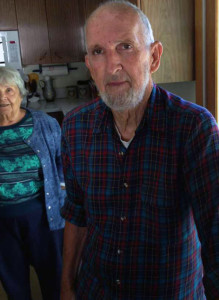‘People are not as nice as they used to be’
by Alex Roberts

NAUGATUCK- Living in one community throughout life, leaving only to join the service, leaves open plenty of opportunity to witness change in that area, as well as the world in general.
Donald Follet, an 80-year-old borough resident, said he has seen a lot of change in how people treat each other and their willingness to help one another.
“People are not as nice as they used to be,” said Follet. “People do not treat each other as well as they used to.”
According to Follet, people in general helped each other a lot more and were more friendly when he was growing up. Interaction between people when he was growing up could be viewed as a warm, extended family in which there was less isolation.
Follet said the economy has fluctuated a lot throughout his life.
“People back then did not make a lot of money for the time, but at least there were more jobs,” said Follet.
The ecomomy today puts people in more difficult scenarios than the past and he remembers a time when there was a much more optimistic outlook for the world in general.
“Jobs today do not offer a lot,” said Follet. “It is a tight time.”
According to Follet, technology has advanced very rapidly since he was growing up.
“It is difficult to say what the most important technological improvement was at any given time, but it is incredible how far technology has progressed,” said Follet.
Among the most notable improvements he has noticed, Follet said, is the evolution of the television.
Despite appreciating advances in technology over the years, Follet said he does not know how to use most of the new devices such as iPhones and computers.
“I don’t know how to use any of it, but I think it is great we have made advances,” said Follet.
Among some of the major shifts in technology he clearly recalls and notices is the continuous advancement of automobiles, said Follet.
“There isn’t a need to even shift automobiles anymore because of automatic transmissions,” said Follet. “That wasn’t possible when our generation was beginning to drive.”
Follet said he is generally worried and concerned for younger generations.
“In my personal opinion, I don’t think they have a good outlook,” said Follet. “I think it is going to be a lot more difficult for the ones coming along.”
According to Follet, the things in his life that helped him find his adult identity was having a family.
“Well, one thing was getting married and having kids, two little girls,” said Follet. “It took me from being a spoiled brat to an adult.”
Follet said he didn’t have any major obstacles when marrying his wife, except for the fact that he was not able to stand in the church because of denominational differences. He said his wife is Catholic and he is Protestant, so he had to stand away from the altar.
In addition, aside from the actual ceremonies, Follet said the act of marriage and things associated, such as receptions, were a lot simpler and economical when compared to today, but still expensive for the time.
“My wife and I drove out to Arizona after getting married,” said Follet. “We had to buy a lot of things and I didn’t make too much money to speak of at the time.”
According to Follet, joining the service helped him to get a good start in life. Follet said he joined the Air Force voluntarily because he wanted to do something different and exciting.
He said he signed up himself at a recruiting station in New Haven and only two days later, he was on his way to training. He completed basic training in upstate New York in about eight weeks and immediately after completing basic training he was sent to Texas to jet school for four months. He said he never flew any aircraft and his job mainly consisted of maintaining helicopters used by pilots-in-training.
Being involved in the Air Force, Follet said, was a both challengeing and positive experience at the same time.
Follet said he was never involved in combat because his job was support as a mechanic.
“I spent four years in the Air Force and I travelled every chance I got,” Follet said. “I wanted to be moving and had no desire to be in the same location the whole time.”
Within the first few months of being in the service, he got to see, visit, and work in states such as Oregon and Iowa. The farthest Follet said he traveled was Japan.
He hopes the most for peace in the world and for every individual to do their best to make a difference.
“It is going to take more than one country or any group of people if the world is to become a better place,” said Follet.